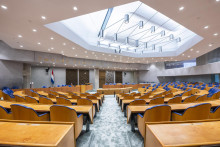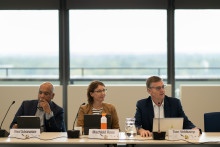In recent weeks, opposition parties have been negotiating with the coalition about the cuts in education and research. Initially, D66 also participated, but in the end only CDA, ChristenUnie, SGP and JA21 remained.
The four coalition parties PVV, VVD, NSC and BBB had to sit around the table, because they do not have a majority in the Senate and the budget was in danger of stranding there. The rest of the opposition will vote against anyway.
The long-term studying fine will not go ahead and the cutbacks on international students will be toned down for shrink regions, but the cuts in science, on the other hand, will be maintained almost entirely.
The details have yet to come out, but it would only have been 'partially' successful in keeping the starter grants for young scientists afloat. There will probably be 40 million euros less cut.
Public transport card
At the bottom line is 748 million euros, but part of that is paid by the Ministry of Education, Culture and Science itself. The public transport student card will be 75 million euros cheaper. This windfall will not be retained for education, so you actually end up with 673 million euros in mitigations.
Furthermore, the money is taken away from somewhere else, for example from the Ministry of Health. Medical specialists will pay more for their refresher training, is one of the agreements. That too is education money, according to the universities.
Biggest loser
Science is the biggest loser of this deal, according to university association UNL. Half a billion euros are still being cut in research and higher education. 'That is particularly bad for the future of the Netherlands,' says chairman Caspar van den Berg, 'because knowledge is our most important raw material. It is good for our students that the long-term student fine will not go ahead.'
Student union LSVb is also happy that 'that ridiculous long-term studying fine' is off the table, but denounces the rest of the cuts. ‘It will not be a quiet Spring for this cabinet,’ says chairman Abdelkader Karbache. He predicts strikes.
The four opposition parties believe that their agreements can be defended themselves. ‘We have made a bad budget less bad,’ said Henri Bontenbal (CDA). Mirjam Bikker (ChristenUnie) states: 'We support good policy, improve proposals where possible and this negotiation result is a good example of that.' Chris Stoffer (SGP) thinks the budget has improved considerably.
Other opposition parties do not understand why these four parties have not negotiated harder. Luc Stultiens (GroenLinks-PvdA) calls the agreement a 'historic blunder'.
Only D66 sounds milder. 'It's good that CDA, JA21, CU and SGP have softened the cutbacks in education somewhat,' Rob Jetten tweets. 'Together, we already got the long-term studying fine off the table.' But he didn't drop out for nothing and still thinks the cuts are too bad.
Geert Wilders (PVV), on the other hand, is 'very happy' that the cabinet can continue. 'I'm relieved, because it was quite a challenge.'
Protest
In twelve cities, employees and students of universities and colleges demonstrated against the government's policy on Wednesday. The protests were organized and supported by WOinActie and trade unions. In Enschede, UT action group 'Twente for Protest' reported in front of the city hall.
At the Vrije Universiteit Amsterdam, a few hundred staff and students formed a chain in front of the main building to protect education and research. A bicycle tour was organized in Nijmegen and in Tilburg, Maastricht, Rotterdam and Groningen whistle concerts sounded against the cutbacks.
In Utrecht, professor and activist Ingrid Robeyns called for strikes. 'Education is the backbone of a democratic society', DUB noted. 'These cuts not only affect the quality of education and research, but also the rule of law itself.'







